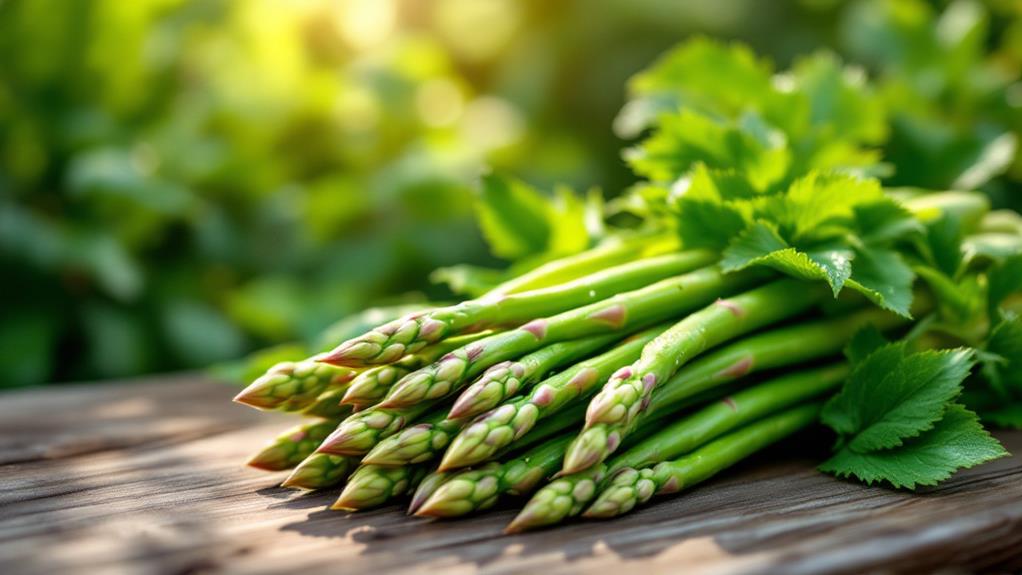The Complete Guide to the Types and Health Benefits of Cucumber
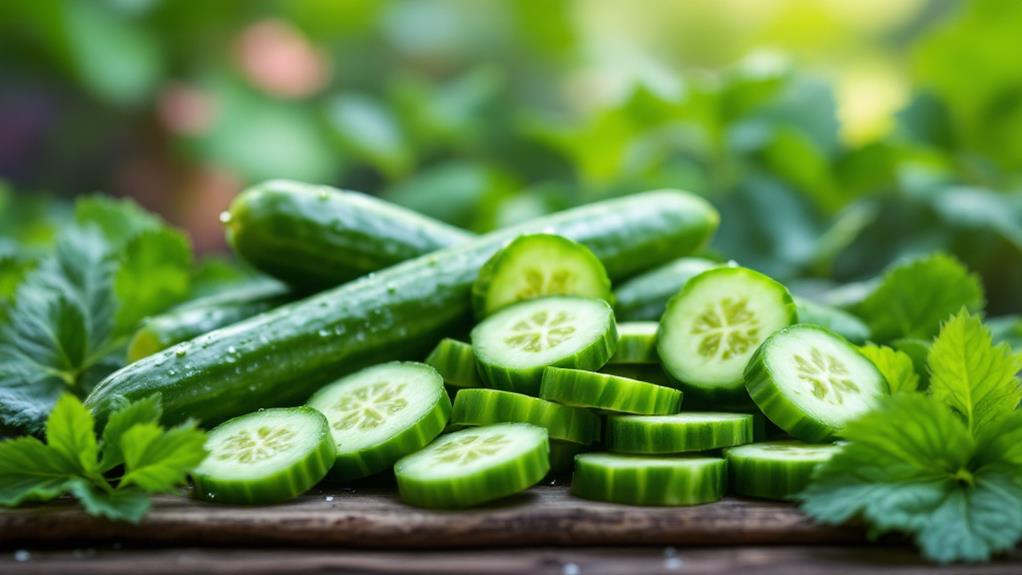
You'll find cucumbers are a hydrating, low-calorie fruit packed with vital nutrients like vitamins A, C, and K, plus potassium and magnesium. They support bone health, heart health, and provide antioxidants to protect against free radicals. With varieties like American slicing, English, Armenian, and gherkins, cucumbers are perfect for salads, sandwiches, or pickling. Eating them helps with hydration and digestion, though they can pose risks for certain individuals, such as those with allergies or on anticoagulants. Properly storing cucumbers optimizes their freshness and benefits. Investigate further to uncover how cucumbers can improve your diet and wellness.
What Are Cucumbers
Cucumbers are technically fruits, part of the same family as watermelons and pumpkins, even though you often find them classified as vegetables in the kitchen. Originating from India, cucumbers offer a mild, slightly melon-like taste, and some types might have a hint of bitterness. They boast a remarkable water content, with 95-96% of their weight being water, making them an excellent source of hydration. This high water content contributes considerably to their health benefits, helping you stay refreshed and hydrated.
Cucumbers come in different types, such as American slicing, English, Armenian, gherkins, and yellow cucumbers, each offering unique flavors and culinary uses. You can enjoy them fresh in salads or sandwiches, or pickled for a tangy twist. Not only do they improve your dishes with their subtle flavor, but they also provide vital vitamins and minerals. Cucumbers deliver vitamins A, C, and K, necessary for maintaining good health. They also supply significant minerals like potassium and magnesium, supporting your body's functions and general well-being. So, adding cucumbers to your diet can be a tasty way to increase your intake of beneficial nutrients.
Nutritional Profile
Beyond their refreshing taste and culinary adaptability, these green wonders pack a punch regarding nutrition. Cucumbers boast an impressive nutritional profile that makes them an outstanding enhancement to your diet. They're low in calories, with just about 16 calories per one-cup serving, so you can enjoy them guilt-free while managing your weight. Thanks to their 95-96% water content, they're excellent for hydration, easily elevating your daily fluid intake.
Cucumbers are rich in fundamental vitamins and minerals. They offer a substantial dose of vitamin K, providing over 41% of your daily requirement, which is significant for bone health and blood clotting. You'll also benefit from vitamin C and B vitamins, which support numerous bodily functions. The minerals in cucumbers, like potassium (around 442 mg per medium cucumber) and magnesium (about 39 mg), play important roles in maintaining heart health and muscle function.
Moreover, cucumbers contain antioxidants such as phytonutrients, including lignans and flavonoids, which help protect your body from harmful free radicals. Although they're not a significant source of dietary fiber, incorporating cucumbers into your meals can contribute to overall health advantages.
Health Benefits
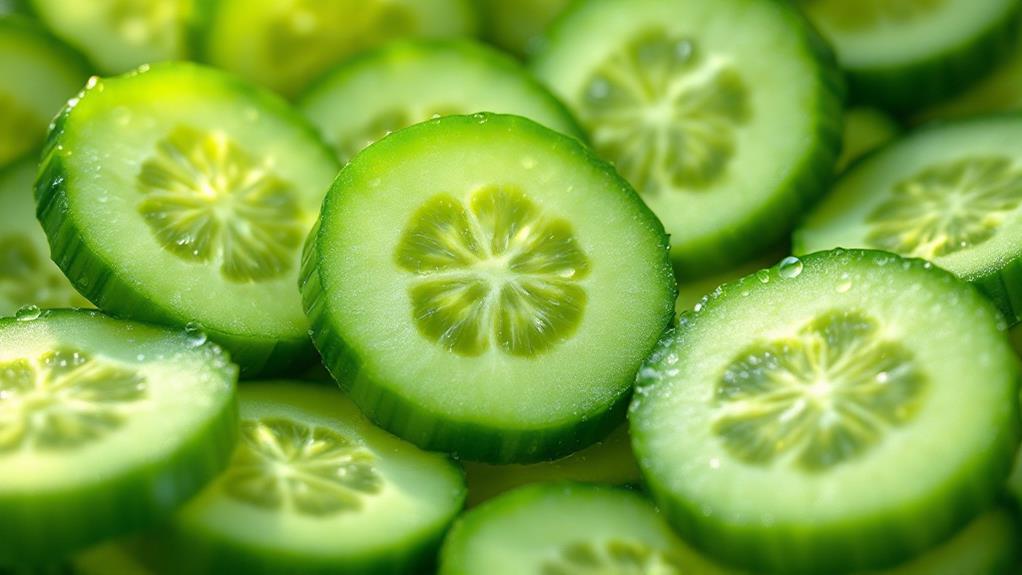
When you incorporate these hydrating powerhouses into your diet, you're not just enjoying their crisp texture but also reaping numerous health benefits. Cucumbers, composed of about 95% water, are fantastic for maintaining hydration, especially in hot weather or during physical activities. Staying hydrated is vital for general health, and cucumbers make it easy.
Packed with Vitamin K, a medium cucumber delivers over 41% of your daily needs. This vitamin is fundamental for bone health and aids in calcium absorption, keeping your bones strong and healthy. The high fiber content, around 1 gram per cup, supports digestive health by promoting regular bowel movements and preventing constipation.
Cucumbers are rich in antioxidants, like flavonoids and beta-carotene, which help fight oxidative stress, potentially reducing the risk of chronic diseases, including heart disease and cancer. Regular consumption might also aid in blood sugar regulation. Studies suggest that cucumber peel extract could help lower blood sugar levels, offering promising benefits for those managing diabetes.
Types of Cucumbers
After exploring the impressive health benefits, let's turn our attention to the different types of cucumbers you can plunge into your meals. The American Slicing Cucumber, typically 12 inches or longer, is mild in flavor and features smooth skin. It's perfect for fresh salads and sandwiches, serving as a nutritious food option that's rich in crucial nutrients. English Cucumbers, known for their seedless, thin skin, offer a sweeter taste compared to other kinds. They're an excellent dietary tool for health, often included in fresh dishes to improve flavor without adding unnecessary calories.
The Armenian Cucumber stands out with its long, ridged appearance and crunchy texture. It's versatile in numerous culinary applications, making it a great choice for salads where you want that extra bite. On the other hand, Gherkins are small, bumpy cucumbers primarily used for pickling. Their tangy flavor is a staple in relishes and condiments, adding zest to your meals. Finally, the Yellow Cucumber, with its round shape and lively color, is popular in South Indian cuisine. Its unique tangy flavor makes it not only a delightful extra to dishes but also a valuable component in a health-conscious diet.
Culinary Uses
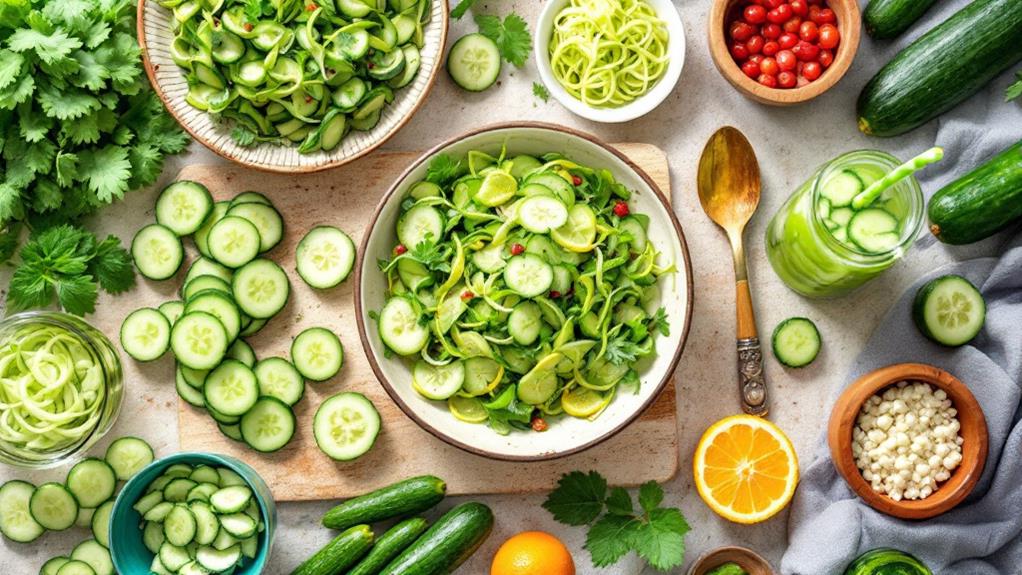
Engage yourself in the culinary versatility of cucumbers, where their crisp texture and mild flavor boost a variety of dishes. You can enjoy cucumbers raw in healthy salads, where they pair beautifully with tomatoes and dressings, contributing a delicious crunch. Their low calories make them a guilt-free supplement to your meals. For a revitalizing twist, consider English cucumbers, which are perfect for sandwiches and wraps due to their seedless nature and thin skin. These cucumbers guarantee a smooth bite without the annoyance of seeds.
If you're a fan of pickling, cucumbers like Kirby or gherkins are ideal. Their firm structure holds up well during the fermentation process, resulting in tangy pickles that can improve any dish. Cucumbers aren't just for eating, either—they're fantastic in drinks. Try blending them into smoothies or juices for a rejuvenating beverage that hydrates and provides vital nutrients. Or, for something simpler, add sliced cucumbers to infused water. Combine them with fruits and herbs to create a flavorful, invigorating drink that's perfect for any occasion. With so many culinary uses, cucumbers are a versatile ingredient that can enrich both your meals and beverages.
Preparation Tips
To get the most out of your cucumbers, it's essential to prepare them properly. Start by giving them a good rinse under cool water. This step helps remove dirt and pesticide residues, especially significant if you plan to consume them unpeeled. The skin is packed with nutrients, so keeping it intact optimizes your health benefits. For a delightful crunch and improved flavor in salads, slice your cucumbers thinly. You can also soak them in salt water for about 30 minutes to reduce water content and elevate their texture.
When it comes to pickling, preparation tips are vital. Use sterilized jars to maintain freshness and prevent contamination. Opt for pickling varieties like Kirby or Gherkins for the best results. If you're storing whole cucumbers, keep them in the crisper drawer of your fridge. Wrap them in a paper towel to extend their freshness for up to a week. On the other hand, sliced cucumbers should be placed in airtight containers with a paper towel to maintain freshness for 2-3 days. These simple steps guarantee you enjoy cucumbers at their best, both in flavor and nutritional value.
Storage Guidelines
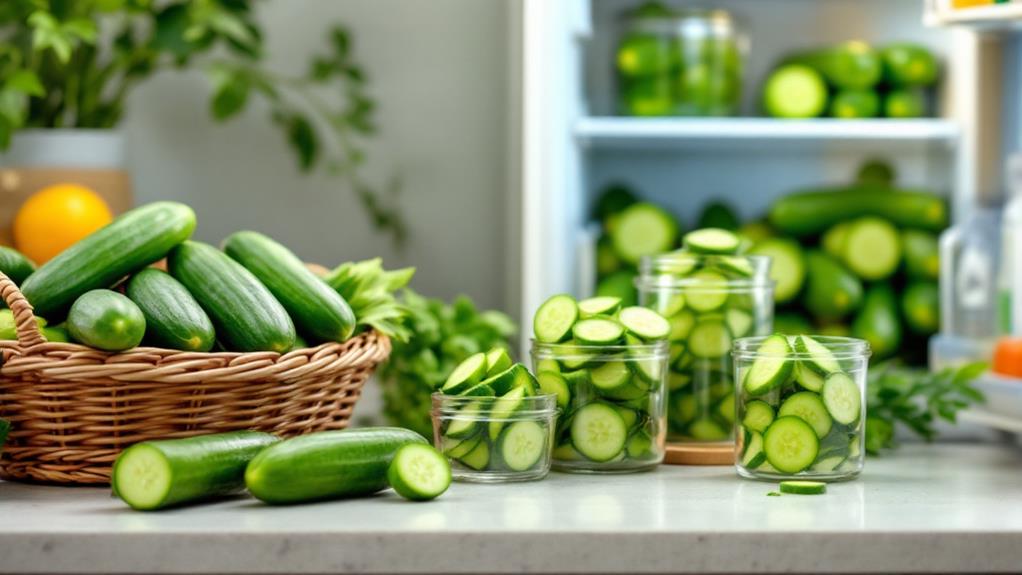
Once you've prepared your cucumbers to perfection, storing them correctly is key to preserving their crispness and nutritional value. For whole cucumbers, the best storage guidelines suggest placing them unwashed in the crisper drawer of your refrigerator. Wrap them in a paper towel to help maintain their crispness for up to a week. This simple step prevents excess moisture from accumulating, which can lead to spoilage. If you've sliced cucumbers, store them in airtight containers, also with a paper towel to absorb any excess moisture. This method keeps the slices fresh for 2-3 days.
When selecting cucumbers, opt for non-waxed varieties. Waxed cucumbers may trap moisture, speeding up decay. It's essential to inspect cucumbers regularly for signs of spoilage, such as yellowing or wrinkling. Address these signs promptly—either consume the cucumbers quickly or discard them to prevent further decay. Also, avoid storing cucumbers near ethylene-producing fruits like bananas and tomatoes, as ethylene gas can accelerate spoilage. By following these storage guidelines, you'll guarantee your cucumbers remain crisp and delicious, ready to improve your meals with their invigorating taste and nutritional benefits.
Potential Risks
Have you ever considered the potential risks that come with enjoying cucumbers? While they're invigorating and nutritious, it's significant to be aware of a few concerns. Initially, consuming too many cucumbers might lead to digestive issues like bloating or gas, thanks to their fiber content. Moderation is key to keeping your tummy happy.
Secondly, chemical exposure is another concern, particularly with non-organic cucumbers. They can carry pesticide residues, so washing or peeling them is vital to minimize this risk. If you're sensitive to chemicals, you'll want to be extra cautious.
Here's a quick look at some other potential risks:
- Allergic reactions: Though rare, they can occur, causing hives or breathing difficulties. Seek medical attention if you experience severe symptoms.
- Oxalates: These compounds in cucumbers may contribute to kidney stones in susceptible individuals. It's wise to consume them in moderation if you're at risk.
- Vitamin K: Cucumbers have high levels of this vitamin, which can affect blood clotting. If you're on anticoagulant medications, monitor your intake to avoid complications.
Who Should Avoid Cucumbers
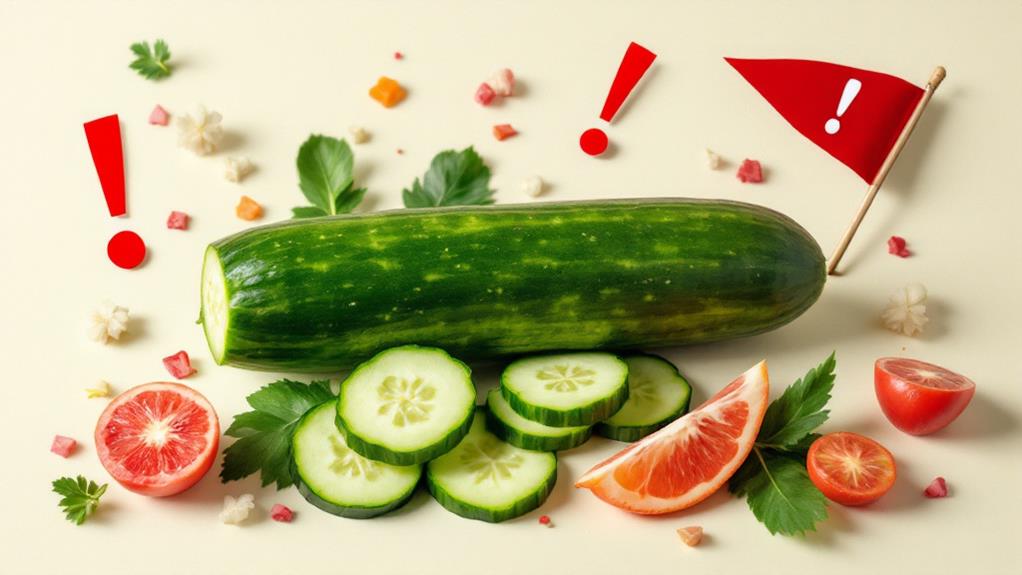
Recognizing the potential risks of cucumbers helps in understanding who might need to steer clear of them. If you have allergies, cucumbers might not be your friend. Allergic reactions can involve hives, itching, or even difficulty breathing, necessitating a break from cucumber consumption. Those dealing with digestive disorders, such as irritable bowel syndrome (IBS), should also be cautious. Cucumbers can lead to bloating or gas, making you feel uncomfortable.
Individuals prone to kidney stones should limit cucumbers due to their high oxalate content, which can worsen your condition. If you're on anticoagulant medications, keep an eye on the cucumber intake. The high vitamin K content in cucumbers might interfere with blood clotting processes, requiring careful monitoring. Pregnant women should consult their healthcare providers before indulging, as excessive cucumber consumption can cause digestive discomfort or other issues during this sensitive time.
Understanding who should avoid cucumbers guarantees you can still enjoy their health benefits without unwanted side effects. Regardless of allergies, digestive concerns, or interactions with medications, knowing when to reduce cucumber consumption can help maintain your comprehensive well-being.

